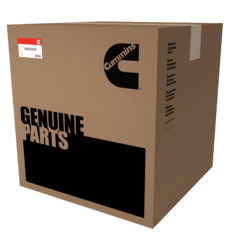This truck part is made by Cummins®. We guarantee that all of our parts are from the OEM (original equipment manufacturer), ensuring a proper fit and quality manufacturing.
We honor the warranty provided by the original equipment manufacturer.
Fuel Filter Element: A Comprehensive Overview
A fuel filter element is a critical component in maintaining the health and performance of an internal combustion engine. Its primary function is to remove contaminants from the fuel system, ensuring smooth engine operation and extending its lifespan.
History of Fuel Filter Elements
The concept of fuel filtration dates back to the early 20th century, when primitive filter elements were used in automotive applications. Over the years, advancements in technology led to the development of more sophisticated filter element designs, materials, and configurations (1).
- Early Developments: The first fuel filters consisted of simple mesh or screen-like structures that trapped larger particles.
- Mid-Century Improvements: The introduction of paper-based filter elements marked a significant improvement in fuel filtration. These early paper filters were often cumbersome and prone to clogging.
- Modern Era: Contemporary fuel filter elements employ advanced materials, such as synthetic fibers, and sophisticated designs that optimize performance and efficiency (2).
Types of Fuel Filter Elements
Fuel filter elements are available in various configurations to suit different engine types and applications. Some common types include:
- Cartridge-Type Filters: These filters feature a pre-assembled filter element and gaskets/seals.
- Element-Type Filters: These require separate purchase of filter elements and gaskets/seals.
- Kit-Type Filters: These typically include multiple filter elements, gaskets/seals, and other components.
Use and Application
Fuel filter elements are widely used across various industries, including:
- Automotive: Passenger vehicles, commercial trucks, and heavy-duty diesel engines (3).
- Aerospace: Aircraft engines and industrial gas turbines.
- Marine: Marine engines and propulsion systems.
Advantages of Fuel Filter Elements
Using a fuel filter element offers numerous benefits, including:
- Improved Engine Performance: By reducing contaminants in the fuel system, fuel filter elements help maintain optimal engine performance (4).
- Extended Engine Life: Preventing damage caused by debris and corrosion, these elements extend the lifespan of internal combustion engines.
- Reduced Maintenance Costs: Minimizing the need for costly repairs or replacements, fuel filter elements reduce maintenance expenses.
Advantages of Different Materials Used in Fuel Filter Elements
Various materials are employed in the construction of fuel filter elements, each offering unique advantages:
- Synthetic Fibers: Provide enhanced filtration efficiency and resistance to chemical degradation (5).
- Paper-Based Elements: Offer a cost-effective solution with decent performance but may require more frequent replacement.
- Metal Mesh: Provides excellent filtration capabilities but can be prone to clogging and corrosion.
Comparison of Different Fuel Filter Element Configurations
When selecting a fuel filter element, consider the following factors:
- Filtration Efficiency: Look for elements with high micron ratings for improved performance.
- Flow Rate: Choose elements that match your engine's specific flow requirements.
- Pressure Drop: Opt for elements with minimal pressure drop to maintain optimal engine performance.
Industry Standards and Certifications
Fuel filter elements must adhere to industry standards and certifications, including:
- ISO 4022: International standard for fuel filters (6).
- SAE J518c: Standard for hydraulic fluid power systems.
- API Certification: American Petroleum Institute certification for fuel system components.
References
- Society of Automotive Engineers (SAE): Publishes standards and guidelines for the automotive industry, including fuel filter elements (7).
- International Organization for Standardization (ISO): Develops and publishes international standards, including ISO 4022 for fuel filters (8).
- American Petroleum Institute (API): Certifies fuel system components, including fuel filter elements.
- National Oilwell Varco: Provides information on fuel filtration systems and best practices.
Conclusion
In conclusion, a fuel filter element is an essential component in maintaining the health and performance of internal combustion engines. With its rich history, diverse types, and widespread use across various industries, this article has provided a comprehensive overview of fuel filter elements, highlighting their advantages, applications, and industry standards.
Additionally, fuel filter elements play a crucial role in ensuring the longevity and efficiency of engines by removing contaminants and debris from the fuel system. By understanding the different types, materials, and configurations of fuel filter elements, individuals can make informed decisions when selecting the right element for their specific needs.
Furthermore, the importance of adhering to industry standards and certifications, such as ISO 4022 and API Certification, cannot be overstated. These standards ensure that fuel filter elements meet certain levels of quality and performance, which is essential for maintaining the health and performance of engines.
In summary, fuel filter elements are a vital component in maintaining the health and performance of internal combustion engines. By understanding their history, types, applications, advantages, and industry standards, individuals can make informed decisions when selecting the right element for their specific needs.
SPECIFICATIONS
RECOMMENDED PARTS
* Variable geometry turbocharger and electronic actuator repairs are not eligible to be claimed as over-the-counter under New or ReCon parts warranty for parts installed after October 1, 2018.
* Diesel Oxidation Catalyst (DOC), Diesel Particulate Filter (DPF), Selective Catalyst Reduction (SCR) catalyst, and Electronic Control Module (ECM) repairs are not eligible to be claimed as over-the-counter under New or ReCon parts warranty for parts installed after January 1, 2020.
* These restrictions are only applicable to New parts and ReCon parts coverages for the components listed above sold to a customer in the US or Canada. All other coverages are excluded. All other regions are excluded.

